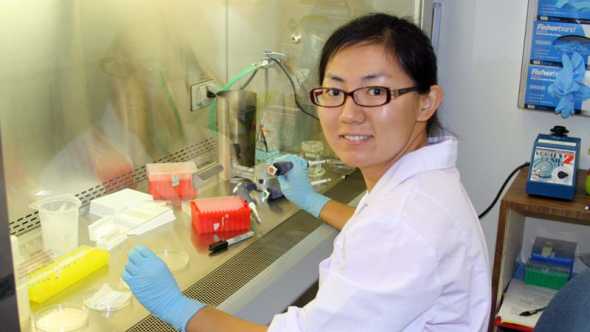Researcher Cooks Up Possible Solution For Citrus Black Spot
According to new UF/IFAS research, dipping fruit after harvest with hot water and essential oil dips might reduce postharvest development of citrus black spot lesions per fruit by up to 50%.

UF/IFAS researcher Jiaqi Yan conducts an in vitro test with the citrus black spot fungus.
Photo by Katia Rodrigues
The new management techniques are the result of Jiaqi Yan’s recently completed doctorate she earned at the University of Florida. Yan’s dissertation focused on citrus black spot and developed postharvest treatments using hot water, fungicides, and essential oils to significantly inhibit the development of citrus black spot lesions.
Citrus black spot is caused by a pathogen called Guignardia citricarpa, a fungal disease first detected in 2010 in an Immokalee grove. Similar to canker, citrus black spot forms dark lesions on fresh fruit skin and adversely impacts the crop’s marketability. The disease is currently believed to be confined to Hendry, Collier, and Polk counties.
“Using hot water and fungicides will restrain the pathogen on the fruit. But, essential oils are more effective against the pathogen,” said Yan, who conducted her research at the UF/IFAS Indian River Research and Education Center.
Yan used essential oils from thyme for the experiments. Small portions of two essential oils, carvacrol and thymol, were mixed into food-grade wax that was then applied to fresh fruit on which citrus black spot lesions were present. The wax is typically used in packinghouses to protect fresh fruit during shipping.
Two additional experiments were conducted to control black spot: One measured the effectiveness of dipping fruit into hot water; a second looked at six commercial fungicides.
“We found the essential oils were more effective in inhibiting the pathogen by 50%,” said Yan. “But the essential oils are expensive, so packers may decide to use commercial fungicides that we identified in our study until the cost of essential oils are lower.” Of the six fungicides tested against the pathogen, thiabendazole, azoxystrobin, and imazalil were the most effective in reducing lesions, Yan said.
Yan said essential oils are a new way to control postharvest disease on fruit and vegetables, but more research is needed to identify the most efficient methods to apply the oils during postharvest. The oils she used are natural essential oils, carvacrol and thymol, at a cost of $1 per 100 oranges.
For now, Yan recommends packinghouse leaders use a combination of hot water and fungicide dips to deter the lesions. More research is needed with the synthetic oils, she said.
“We found that dipping fruit into water at 56° Celsius for 120 seconds significantly inhibited lesion development on fruit that had citrus black spot symptoms,” said Yan.
“Using hot water along with fungicides is the best treatment for citrus black spot at this time because the fungicides are already commercially used,” said Yan. “We are considering more tests with synthetic essential oils because they are affordable.”









